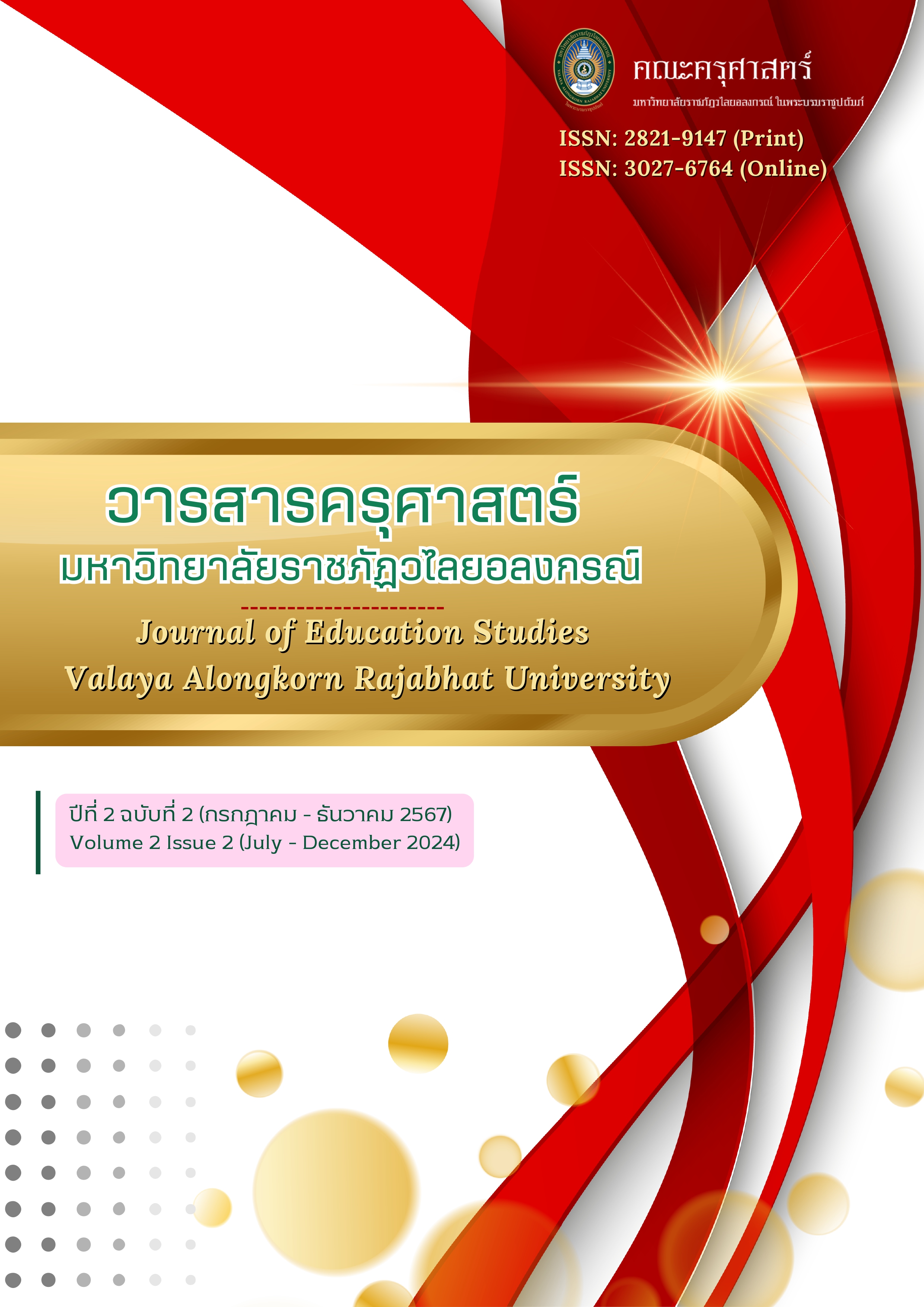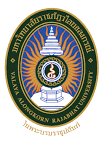Trends in Organizing Learning using Games as a Basis Science
Keywords:
Game-based learning, Science teaching, Student DevelopmentAbstract
Game-based learning in science teaching aims to synthesize research related to game-based learning in science teaching. The synthesis issues are classified into 4 traits: 1. Studying the countries that use game-based learning in science teaching. 2. Studying the target group in game-based learning research in science teaching. 3. Studying the game formats used by researchers in teaching science. 4. Studying the development of students’ competencies of researchers. The method for studying the current trends in game-based learning research in science teaching for a 5-year period from 2019 to 2023 consists of 4 steps: 1. Selection of research. 2. Identification and systematic categorization. 3. Analysis and synthesis of the study results. 4. Summary and discussions of the results. The study of game-based learning trends over a 5-year period revealed that the United States is the country that has conducted the most research on game-based learning. The target groups of researchers are students, student teachers, and teachers. The types of games that researchers use to teach science that are most commonly used are 1) Digital Games, 2) Video Games, 3) Online Games, 4) AR Games, 5) Board Games, 6) Mobile Games, 7) VR Games, and E-book Games, respectively. Researchers use games to develop learners in 4 areas: 1) Knowledge Development, 2) Skill Development, 3) Attitude Development, and 4) Science Process Skill. The game format is adjusted to keep up with the learners' times. Most of the games are easy for learners to access and can integrate related knowledge to achieve the game's goals of finding a way to finish the game. This part will help promote learners to gain more knowledge and understanding of science content, leading to the development of learning achievement and learning skills in various areas so that learners can learn by themselves and apply them in the future.
References
ชณัตถ์ พูนเดช. (2559). แนวทางการจัดการเรียนรู้ด้วยเกมมิฟิเคชั่น. วารสารศึกษาศาสตร์มหาวิทยาลัยนเรศวร, 18(3), 331-337.
ธนัญภัสร์ ศรีเนธิยวศิน. (2564). การจัดการเรียนการสอนโดยใช้เกมเป็นฐานที่มีต่อผลสัมฤทธิ์ทางการเรียนของนักศึกษา. วารสาร มจร บาฬีศึกษาพุทธโฆสปริทรรศน์, 7(3), 42-53.
ประหยัด จิระวรพงศ์. (2565). Games Based Learning. สื่อการเรียนรู้รูปแบบใหม่ของไทย. สืบค้นจาก http://nuybeam.blogspot.com
ปริศนา มัชฌิมา. (2565). การสอนแบบออนไลน์กับการจัดการเรียนรู้โดยใช้เกมเป็นฐาน. วารสารพัฒนาเทคนิคศึกษา, 34(123), 13-15.
วิไลวรรณ แสนพาน. (2561). แนวคิดทฤษฎีเกี่ยวกับการเรียนรู้. สืบค้นจาก http://www.nanabio.com/
สถาบันส่งเสริมการสอนวิทยาศาสตร์และเทคโนโลยี. (2566). การแถลงข่าวผลการประเมิน PISA 2022. สืบค้นจาก https://pisathailand.ipst.ac.th
สถาพร พฤฑฒิกุล. (2561). คุณภาพผู้เรียนเกิดจากกระบวนการเรียนรู้ QUALITY OF STUDENTS DERIVED FROMACTIVE LEARNING PROCESS. วารสารการบริหารการศึกษา มหาวิทยาลัยบูรพา, 6(2), 3-12.
สังวรณ์ งัดกระโทก และอนุสรณ์ เกิดศรี. (2561). การประเมินวินิจฉัยการรู้วิทยาศาสตร์ของนักเรียนชั้นมัธยมศึกษาตอนต้นด้วยโมเดล G-DINA. วารสารศึกษาศาสตร์มหาวิทยาลัยขอนแก่น, 41(4), 37-54.
สำนักงานคณะกรรมการการศึกษาแห่งชาติ. (2544). รายงานการพัฒนาตนเองของบุคลากรทั้งโรงเรียนเกี่ยวกับกระบวนการเรียนรู้ที่เน้นผู้เรียนเป็นสําคัญ. กรุงเทพฯ: สํานักงานคณะกรรมการการประถมศึกษาแห่งชาติ.
Behnamnia, N., Kamsin, A., Ismail, M., & Hayati, A. (2020). The effective components of creativity in digital game-based learning among young children: A case study. Children and Youth Services Review, 16(3), 105-227.
Bressler, D., Bodzin, A., Eagan, B., & Tabatabai, S. (2019). Using epistemic network analysis to examine discourse and scientific practice during a collaborative game. Journal of Science Education and Technology, 28(3), 553-566.
Chaichuai, Y., & Srivilai, P. (2015). A comparison of argumentative and critical thinking abilities from learning socioscientific issues using the mixed methods based on the scientific method and problem–based learning method of grade 9 students with different learning achievement motivations. Valaya Alongkorn Review, 5(1), 99-114.
Chen, C. H., Huang, K., & Liu, J. H. (2020). Inquiry-enhanced digital game-based learning: Effects on secondary students’ conceptual understanding in science, game performance, and behavioral patterns. The Asia-Pacific Education Researcher, 29(4), 319-330.
Cheng, K. H. (2023). Development of an immersive virtual reality system for learning about plants in primary education: evaluation of teachers’ perceptions and learners’ flow experiences and learning attitudes. Educational technology research and development, 72(2), 1-23.
Clapson, M., Gilbert, B., & Musgrove, A. (2020). Race to the reactor and other chemistry games: game-based and experiential learning experiences in materials and polymer chemistry. Journal of Chemical Education, 97(12), 4391-4399.
Fernández, D., Gordillo, A., Alarcón, P., Tovar, E., & Member, S. (2021). IEEE TRANSACTIONS ON EDUCATION 1 Comparing Traditional Teaching and Game-Based Learning Using Teacher-Authored Games on Computer Science Education. Journal IEEE TRANSACTIONS ON EDUCATION, 99(1), 1-7.
Gnidovec, T., Žemlja, M., Dolenec, A., & Torkar, G. (2020). Using augmented reality and the structure–behavior–function model to teach lower secondary school students about the human circulatory system. Journal of Science Education and Technology, 29(4), 774-784.
Huang, R., Hwang, G. J., Kong, S. C., & Chen, W. (2020). Journal Computerin Education. Retrieved from https://link.springer.com/journal/40692
ITHAKA. (2020). Journal of Science Teacher Education. Retrieved from https://www.jstor.org/journal/jscieteaceduc
Janković, A., Maričić, M., & Cvjetićanin, S. (2023). Comparing science success of primary school students in the gamified learning environment via Kahoot and Quizizz. Journal of Computers in Education, 14(1), 1-24.
Knezek, G., Christensen, R., & Gibson, D. (2022). Empathy: How Can Technology Help Foster Its Increase Rather Than Decline in the 21st Century?. In Social and Emotional Learning and Complex Skills Assessment: An Inclusive Learning Analytics Perspective, 11(2), 51-73.
Mohanty, A., Alam, A., Sarkar, R., & Chaudhury, S. (2021). Design and Development of Digital Game-Based Learning Software for Incorporation into School Syllabus and Curriculum Transaction. Design Engineering, 8(1), 4864-4900.
Nkadimeng, M., & Ankiewicz, P. (2022). The affordances of Minecraft education as a game-based learning tool for atomic structure in junior high school science education. Journal of Science Education and Technology, 31(5), 605-620.
Palisbo, V., Pusta, A., & Razo, J. (2022). A Dual Development of Board Game and Guided-Inquiry Activity in Teaching Electricity for Grade 5. International Journal of Science Education and Teaching, 1(3), 160-179.
Polat, E., Hopcan, S., Yildiz Durak, H., Tosunoğlu, E., Pekyürek, M. F., Yilmaz, Ö., & Çakır, O. (2022). A maths serious game for mobiles: A study on design and development. In STEM, Robotics, Mobile Apps in Early Childhood and Primary Education: Technology to Promote Teaching and Learning. Retrieved from https://content.e-bookshelf.de/media/reading/L-18211578
Sala, G., Tatlidil, K. S., & Gobet, F. (2020). Video game training does not enhance cognitive ability: A comprehensive meta-analytic investigation. Psychological bulletin, 144(2), 111-136.
Science Education Association Thailand. (2023). International Journal of Science Education and Teaching. Retrieved from https://so07.tci-thaijo.org/index.php/IJSET/index
Srisawasdi, N., & Panjaburee, P. (2019). Implementation of game-transformed inquiry-based learning to promote the understanding of and motivation to learn chemistry. Journal of Science Education and Technology, 28(2), 152-164.
Udeozor, C., Toyoda, R., Abegão, F., & Glassey, J. (2023). Digital games in engineering education: systematic review and future trends. European Journal of Engineering Education, 48(2), 321-339.
Wang, X., Cheng, M., & Li, X. (2022). Teaching and learning computational thinking through game-based learning: A systematic review. Journal of Educational Computing Research, 61(7), 1505-1536.
Wang, Y. (2019). A Preliminary Study of Adopting Game-based Learning and E-books to Support Science Learning.
Wiley online Library. (2021). British Journal of Education Technology. Retrieved from https://onlinelibrary.wiley.com/journal/1098237x
Wiley online Library. (2023 May, 5). Journal Science and Education. Retrieved from https://onlinelibrary.wiley.com/journal/1098237x
YAZICIOĞLU, S., & GÜNGÖREN, S. (2019). Investigate the Effect of Game-Based Activities on Middle School Students' Science Learning According to Achievement Motivation Attitude and Gender Variables. Journal of Science and Mathematics Education, 13(1), 390-396.
Yılmaz, E., Yel, S., & Griffiths, M. (2022). Comparison of children's social problem-solving skills who play videogames and traditional games: A cross-cultural study. Computers & Education, 187(7), 104-548.
Zhang, Z., Muktar, P., Ong, C., Lam, Y., & Fung, F. (2020). CheMakers: Playing a Collaborative Board Game to Understand Organic Chemistry. Journal of Chemical Education, 98(2), 530-534.
Zuiker, S., Piepgrass, N., Tefera, A., Anderson, K., Winn, K., & Fischman, G. (2019). Advancing knowledge mobilization in colleges of education. International Journal of Education Policy and Leadership, 15(1), 1-12.












